
***NEW MUP EVALUATION REPORT*** Our final report evaluating the impact of minimum unit pricing in Scotland on harmful drinkers is available here: publichealthscotland.scot/publications/e…
The results tell a nuanced story from many data sources:
- New survey and interview data with people presenting for treatment with alcohol problems;
- Interviews with harmful drinkers in the community;
- A long-running market research survey.
And one abandoned piece of work.
- New survey and interview data with people presenting for treatment with alcohol problems;
- Interviews with harmful drinkers in the community;
- A long-running market research survey.
And one abandoned piece of work.
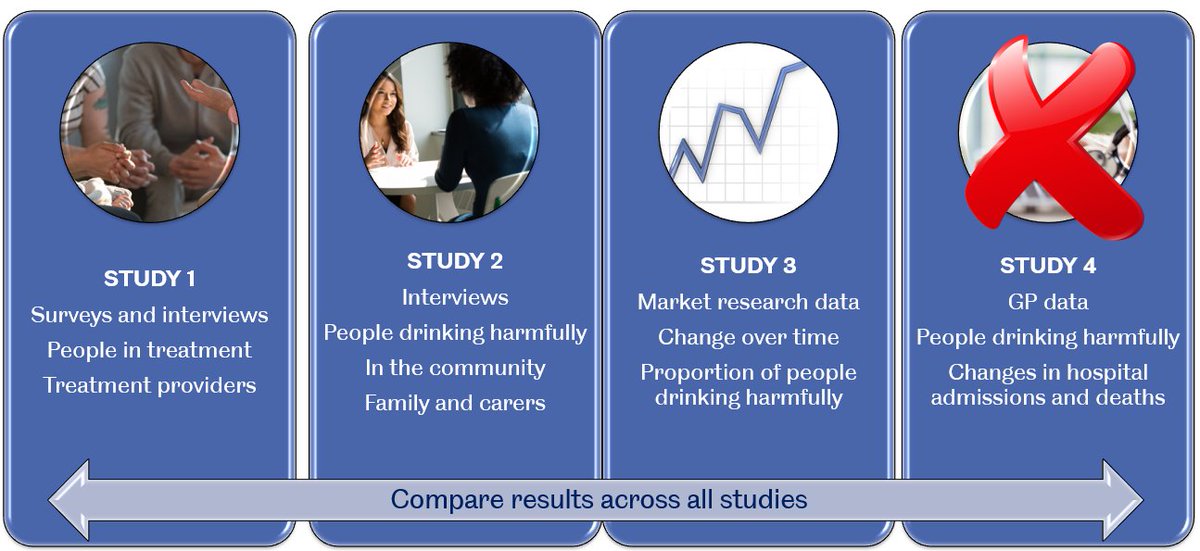
We collected or drew on data from:
- The general population of people drinking harmfully;
- People presenting for treatment for alcohol problems;
- Those providing that treatment;
- People drinking harmfully or in recovery in the community;
- Family members and carers.
- The general population of people drinking harmfully;
- People presenting for treatment for alcohol problems;
- Those providing that treatment;
- People drinking harmfully or in recovery in the community;
- Family members and carers.
The data were collected before and after the introduction of MUP in both Scotland and Northern England - so this is a controlled natural experiment and we relied mostly on difference-in-difference methods.
***Our results are not a final judgement on whether MUP works***
They need to be understood in the context of previous evidence and some important strengths and limitations of our methods
They need to be understood in the context of previous evidence and some important strengths and limitations of our methods
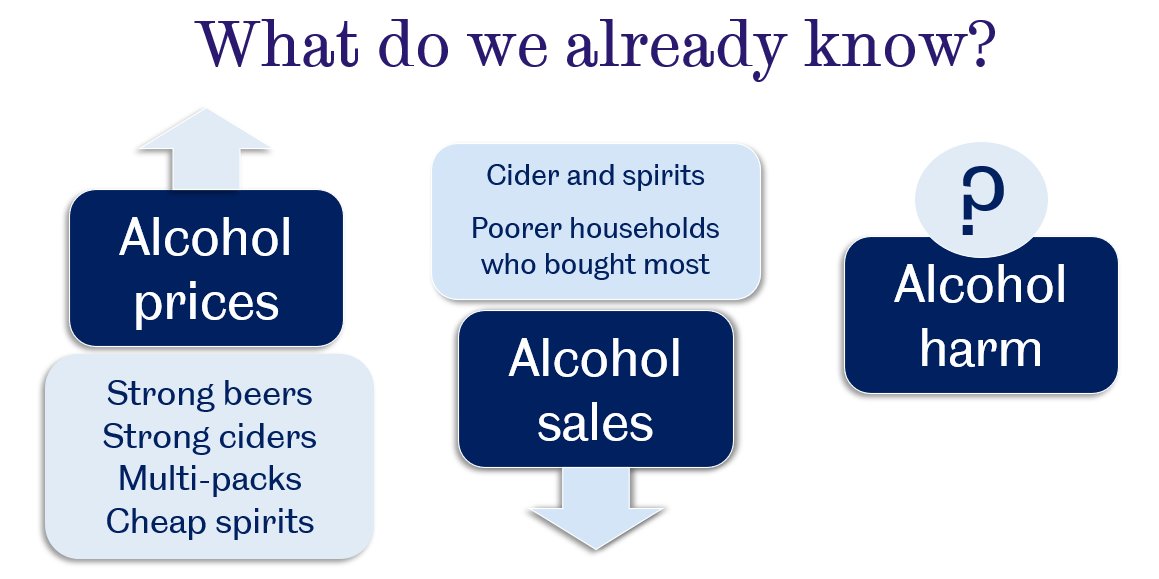
Also, remember harmful drinkers are ~5% of the Scottish population. MUP was targeted at this group.
Only around ~1% of the Scottish population are dependent on alcohol. MUP was not really targeting this group, who are better supported by other approaches (e.g. treatment)
Only around ~1% of the Scottish population are dependent on alcohol. MUP was not really targeting this group, who are better supported by other approaches (e.g. treatment)
We had FIVE key findings:
Finding 1: MUP definitely increased the price of alcohol purchased by people with alcohol dependence.
- The average price paid per unit increased from £0.49 to £0.59.
- 62% said prices had changed.
- 99% of those said prices had gone up.
Finding 1: MUP definitely increased the price of alcohol purchased by people with alcohol dependence.
- The average price paid per unit increased from £0.49 to £0.59.
- 62% said prices had changed.
- 99% of those said prices had gone up.
Finding 2: There was no clear evidence MUP reduced alcohol consumption or dependence severity in this group.
BUT
Remember we have evidence from other studies that MUP reduced alcohol sales, including among the highest purchasing households bmj.com/content/366/bm…
BUT
Remember we have evidence from other studies that MUP reduced alcohol sales, including among the highest purchasing households bmj.com/content/366/bm…
And, it was complicated. The prevalence of harmful drinking did not change significantly in our time series analysis. But there was a significant drop in the prevalence of hazardous drinking of 3.5% and a commensurate (but non-significant) increase in moderate drinking 
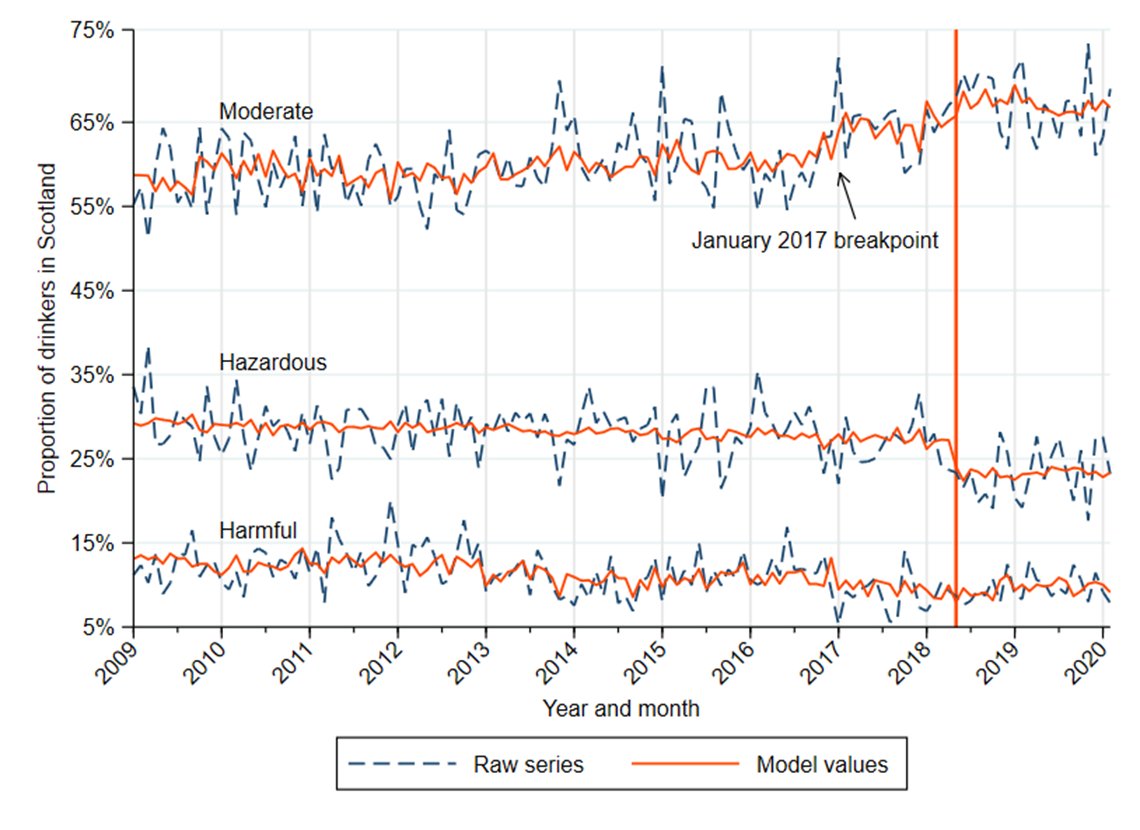
We weren't powered to detect smaller consumption changes in our treatment sample, but our qualitative data showed a mixed picture.
Some people reported drinking less and switching to drinking spirits (usually vodka) and attributed this to MUP.
Some people reported drinking less and switching to drinking spirits (usually vodka) and attributed this to MUP.
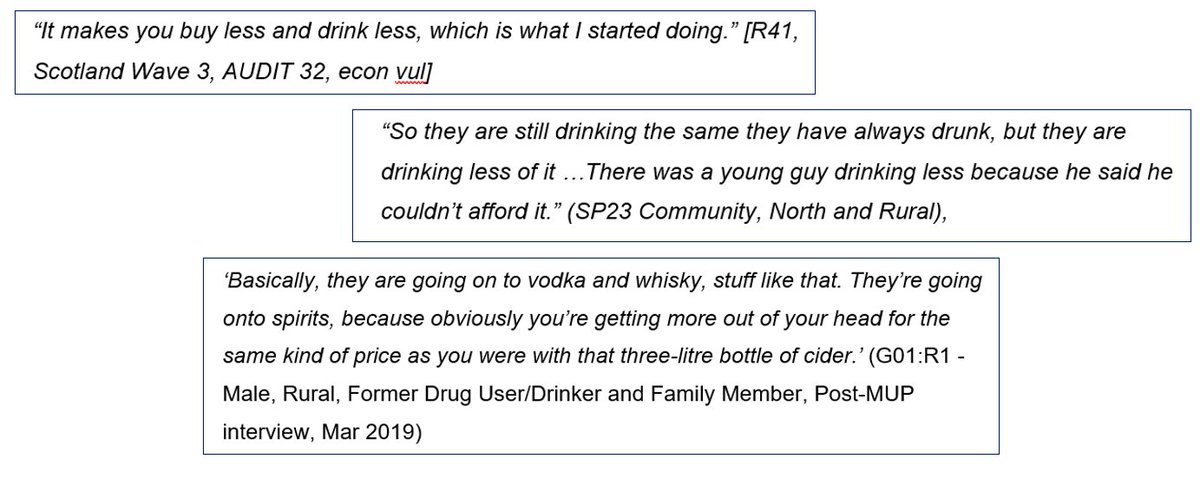
So when we say 'NO CLEAR EVIDENCE of a reduction in consumption', we chose our words carefully. There is evidence and counter-evidence. We definitely can't conclude MUP reduced consumption among people drinking harmfully but we're also not able to conclude that it didn't.
Finding 3: Some economically vulnerable people drinking at harmful levels experienced financial strain from MUP. In our treatment sample:
- 20% reduced other spending;
- 17% bought cheaper alcohol;
- 14% found more money (e.g. borrowing)
- Most said this was due to MUP
- 20% reduced other spending;
- 17% bought cheaper alcohol;
- 14% found more money (e.g. borrowing)
- Most said this was due to MUP
The qualitative data tells some difficult stories of this financial strain.
Importantly, many of these speakers were using similar strategies to afford alcohol before MUP. The effect of MUP was largely to intensity existing behaviours, not create new ones.
Importantly, many of these speakers were using similar strategies to afford alcohol before MUP. The effect of MUP was largely to intensity existing behaviours, not create new ones.
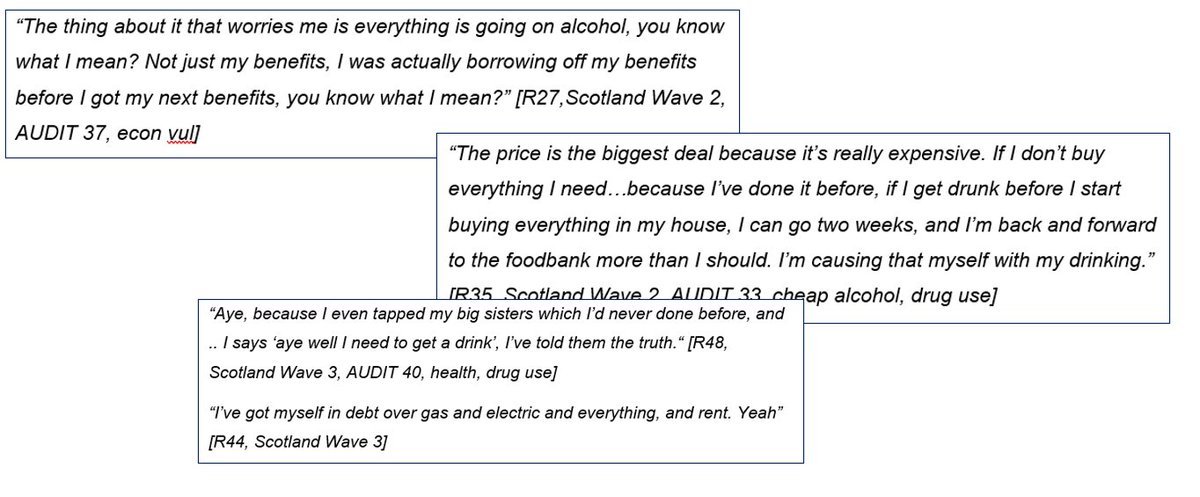
The changes in frequency of benefit payments caused by Universal Credit also played a role here, often exacerbating the financial strain that households felt. 

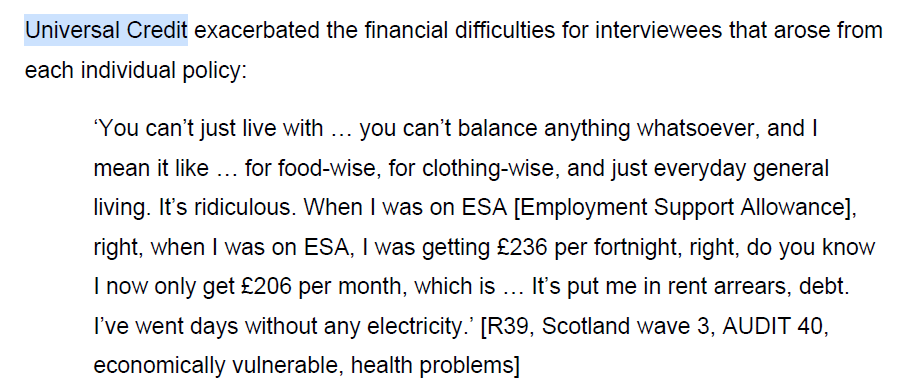
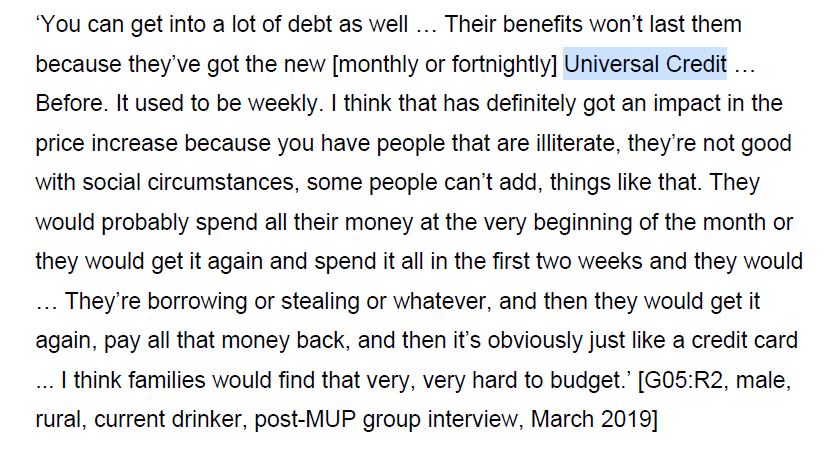
Finding 4: There was little evidence of wider negative or harmful effects in areas including:
- Illicit drug use;
- Theft or other crime;
- Drinking non-beverage alcohol (e.g. mouthwash);
- Acute withdrawal symptoms.
- Illicit drug use;
- Theft or other crime;
- Drinking non-beverage alcohol (e.g. mouthwash);
- Acute withdrawal symptoms.
This is really important. There were LOTS of questions and criticisms about the potential for these harmful effects before the introduction of MUP.
So we shouldn't gloss over these null results - they are key findings that help policy-makers to address stakeholder concerns.
So we shouldn't gloss over these null results - they are key findings that help policy-makers to address stakeholder concerns.
One tricky area though is whether the switch from drinking beer or cider to drinking spirits led to increased intoxication and then to increased violence.
CRUCIAL POINT: We found qualitative evidence of increased intoxication but only CONCERNS about increased violence.
CRUCIAL POINT: We found qualitative evidence of increased intoxication but only CONCERNS about increased violence.

Please, please, please do not claim that MUP led to increased violence. We have no evidence of that. It's a legitimate concern. It is an important area for future research. But it is not a finding from our study.
Finding 5: People with alcohol dependence of drinking at harmful levels had only limited awareness and understanding of MUP and reported receiving no additional information or support before, during or after the introduction of the policy.
This is surprising given the long lead-up to the policy and the concerns about potential negative impacts on people with dependence. We didn't detect any evidence it led to additional harm. But it's something future policy makers should consider for their implementation plans.
There's lots of other good stuff in the report including:
- Detailed quantitative information on the characteristics of people presenting for treatment;
- Evidence on cross-border trade;
- Lots of qualitative data on how people responded to MUP.
- Detailed quantitative information on the characteristics of people presenting for treatment;
- Evidence on cross-border trade;
- Lots of qualitative data on how people responded to MUP.
There's also a good discussion of what the results mean and why they did not align with our model.
We explore why people might not have reduced their drinking including non-responsiveness, unsustainable responses and the potential for affecting future not current dependence.
We explore why people might not have reduced their drinking including non-responsiveness, unsustainable responses and the potential for affecting future not current dependence.
We do take seriously the idea that MUP might not be working as intended. However, we also discuss the elephant in the room - an MUP that is still at the level proposed 13 years ago. 
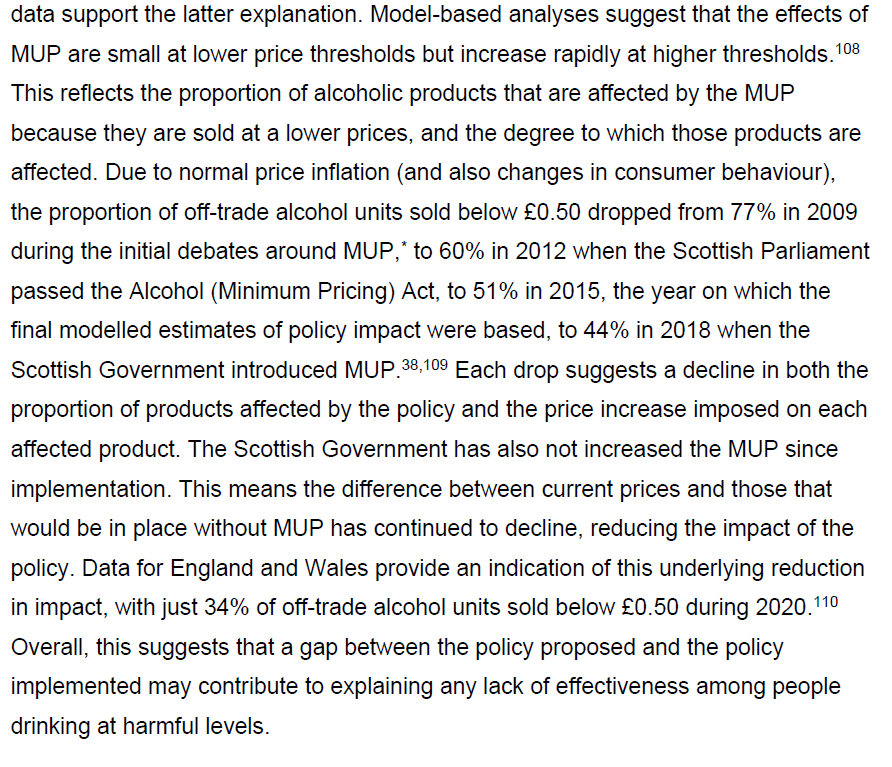
That's it. Five years of work with some brilliant colleagues distilled into one report.
Remember: This is not the final judgement on MUP. It is just one of more than 20 studies that Public Health Scotland will review and summarise for a report to the Scottish Parliament.
Remember: This is not the final judgement on MUP. It is just one of more than 20 studies that Public Health Scotland will review and summarise for a report to the Scottish Parliament.
PS: At no point in our report or the press materials do we refer to people with dependence as alcoholics.bbc.co.uk/news/uk-scotla…
Those fantastic colleagues include @AndyPerkins1970 @Figure8C @pennybuykx @sheffunisarg @AbigailStevely @pmeierprof @VictimOfMaths @Alan_Brennan @wulflivingston and all the excellent treatment services, recovery groups and NHS sites who supported the work
Special thanks to the team of Privileged Access Interviewers who used their experiences of harmful drinking to support the project and generate some of the interview data that went into the final report.
And I forgot @jenniferevab, who did fabulous work on the treatment population data (NB: don't try to remember long author lists while eating breakfast)
• • •
Missing some Tweet in this thread? You can try to
force a refresh



